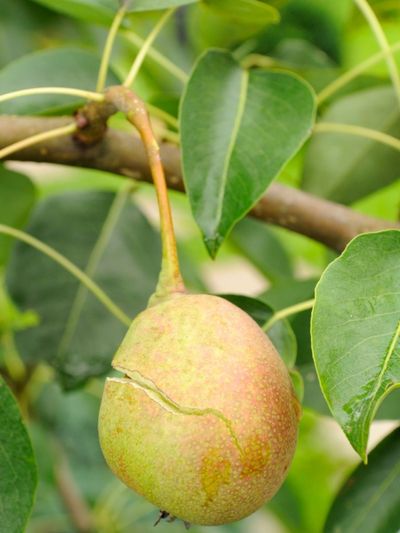Why Do Pears Split?
Cracking of pear fruit arise from one factor – water. Simply put, a lack of water followed by a surplus of water is what causes pears to split. The same goes for nearly any other fruit cracking. Split pear fruit is a condition that is caused by an irregular supply of water. While the splits are not usually deep, they may be enough to invite disease or pests to attack otherwise tasty fruit. Sometimes, the fruit will “heal” itself by scabbing over the split areas. The fruit may not look very pretty but will still be edible. A dry period followed by heavy rains causes the fruit to swell too quickly. The plant’s cells swell rapidly, and the accelerated growth can’t be contained and results in pears that are splitting. This can also happen if the weather has been wet throughout the growth season. Stretches of wet, cool, humid weather make pears more prone to splitting.
How to Keep Pears from Splitting
While you can’t control Mother Nature, you can improve your chances of avoiding split fruit. First off, during hot, dry periods, keep the tree watered on a regular basis. In the event of a sudden rain, the tree will be more likely to absorb what water it needs and not become shocked into uptaking copious quantities that it can’t handle. The best remedy is a long term solution. It starts when you first plant your pear trees. At planting, incorporate plenty of well-rotted organic matter into the soil. This will help the soil retain moisture that, in turn, increases its capacity to release water to the roots during dry spells. If you did not amend the soil at planting time, apply a 2-inch layer of grass clippings in the spring when the soil is still wet. This will help retain moisture and will eventually break down to improve the soil.
